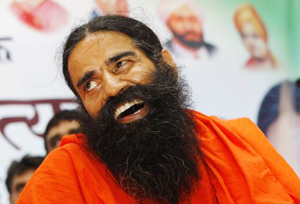Leh(JK), Aug 24: India's premier defence research organisation DRDO has now roped in yoga guru Ramdev's Patanjali Ayurveda Limited to manufacture and market in the country and abroad some herbal supplements and food products developed by it.
DRDO today entered into licensing agreements with Ramdev's company for transfer of Seabuckthorn technology based products developed by Defence Institute of High Altitude Research (DIHAR).
The technology has been transferred under the DRDO FICCI ATAC (Accelerated Technology Assessment&Commercialisation) programme that has been established to identify spin-off technologies for commercial markets within India and abroad, with a special focus on social benefit technologies, an official statement said.
DIHAR, a frontier laboratory of DRDO which is located in Leh with detachments in the strategic Siachen sector has pioneered cold arid-agro animal technologies for augmenting local availability of fresh food in the region.
The laboratory, through its translational laboratory to land approach, develops technologies for fresh food cultivation, poultry, goat and dairy farming and green house cultivation which are disseminated to the local farmers.
Speaking on the occasion, Defence Minister Manohar Parrikar said seabuckthorn is a unique product. "Apart from what has been commercialised, there are many more applications which Patanjali Ayurveda could explore to exploit the full potential of Seabuckthorn," he said.
Parrikar wanted Patanjali Ayurveda to bring many more health products to exploit the full potential of the technologies beyond what DIHAR has found out.
He added that DRDO in collaboration with FICCI under DRDO FICCI ATAC programme is striving to commercialise more and more spin off technologies for the benefit of society at large.
DRDO Chief S Cristopher mentioned that DIHAR has been relentlessly working for development of products which in addition to their usefulness for Armed Forces has tremendous commercial potential in India and abroad.
"The benefits of the research done by DIHAR will help the local population to derive the economic benefits," he said.
While giving an overview, Bhuvnesh Kumar, Director, DIHAR said that the farmers adopt the technologies developed by his scientists and sell their produce to the army.
"This unique approach not only results in local availability of fresh food but also results in socio-economic development of Ladakh and stronger civil-military cooperation in this strategically important region," the statement quoted him as saying.





Comments
This iis the reaso why smokers are trying to
find a way to stop smoking- at least. Technological advancements
today have led to the creation of the new electronic cigarette, a device that aims to help
even the most seemingly hopleless smoker to quit. When you opt
to make a purchase online, you will bbe able to review different
variieties to find the electronic cigarettes and accessories that are suitable tto you and
are within youur budget.
Taake a look at my web blog - elektronik sigara ovale: http://www.samuraiweapons.org/go.php?url=http://www.pusha.se/excellent-…
It is a conhstant process in each moment tto focus your thoughts and subsequent actionss into happiness, juyst like itt is a process in each moment to fokcus your thoughtts and subsequent actions to be in line with
enlightenment. It uses the excess fat from oour body
as a source of fuel and manages appetite and excessive food cravings.
this is by far the most common beneftit people know about green coffee bean extracts.
Here is my web-site ... yesil kahve kullananlar: http://www.tederojones.com/?option=com_k2&view=itemlist&task=user&id=45…
Add new comment